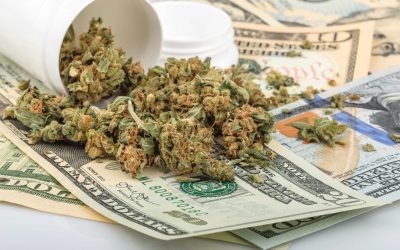Marijuana Goes to House Floor with Landslide Victory for Safe Banking Act

For the first time since the war on marijuana was declared by President Richard Nixon, progressive marijuana law reform was considered on the Floor of the House of Representatives, and won by a landslide. Now, it is likely to be considered by the Senate.
Yesterday, members of the House of Representatives voted 321 to 103 in favor HR 1595: The SAFE Banking Act, which amends federal law so that banks and other financial institutions may explicitly work directly with state-legal marijuana businesses. If the SAFE Banking Act becomes law, it will be a major advancement for legal and medical marijuana sales.
This historic vote marks the first time that a chamber of Congress has ever held a successful floor vote on a stand-alone piece of marijuana reform legislation. NORML reports the Act won with 79% of the vote and it was bi-partisan. It included 99% of the Democratic majority caucus and 47% of the Republican minority caucus. For the first time, a supermajority of the House voted affirmatively to recognize that the legalization and regulation of marijuana is a superior public policy to prohibition and criminalization.
There are very positive signs that the Senate is likely to approve the legislation as well. Politico reports that the likelihood of passage in the Senate is looking good and President Trump has not expressed opposition. They write,
“The Senate is poised to take up legislation to boost the nation’s booming cannabis industry, with its backers feeling bullish and selling it as a bill that is more about banking than marijuana.”
The fact that 33 states and counting that have legalized marijuana in some form present the Senate with a reality that cannot be ignored. Public opinion by more than 60% supports legal adult use of marijuana with even higher percentages for medical marijuana. Current federal law is out-of-step with the views of people in the United States as well as with state law. The chairman of the Senate Banking Committee Mike Crapo (R-Idaho), who after months of weighing the issue, said he wants to advance the legislation.
The Senate bill also includes banking for the hemp industry, making it more likely that Majority Leader Mitch McConnell, from a hemp producing state, will likely support the SAFE Banking Act. It is not only the marijuana law reform movement supporting the law but the banking and insurance industries. Politico reports the “American Bankers Association President and CEO Rob Nichols said the cannabis bill will be a “key priority” when the group’s members visit Washington to meet with lawmakers this fall.”
NORML explains why this law should be supported by reformers writing in an email:
“Federal law currently defines all marijuana-related endeavors as criminal enterprises, including those commercial activities that are licensed and legally regulated under state laws. Therefore, almost no state-licensed cannabis businesses can legally obtain a bank account, process credit cards, or provide loans to small businesses and entrepreneurs.” It is absurd that a rapidly growing multi-billion dollar industry must operate largely on a cash-only basis.
Today’s vote is a significant first step, but it must not be the last. Much more action will still need to be taken by lawmakers. We demand that lawmakers in the Senate Banking Committee hold true to their commitment to move expeditiously in support of similar federal reforms. And in the House, we anticipate additional efforts to move forward and pass comprehensive reform legislation like The MORE Act — which is sponsored by the Chair of the House Judiciary — in order to ultimately comport federal law with the new political and cultural realities surrounding marijuana.”
NORML has a call to action demanding Congress do MORE.
The Marijuana Opportunity, Reinvestment, and Expungement (MORE) Act, bipartisan legislation introduced by House Judiciary Chairman Jerry Nadler, removes the marijuana plant from the Controlled Substances Act, thereby de-scheduling the substance at the federal level and enabling states to set their own regulatory policies absent the threat of federal interference.
The MORE Act also seeks to address many of the past wrongs of marijuana criminalization. Specifically, it would appropriate a portion of the federal taxes collected from the legal industry to pay for the expungement of past criminal records and to partially fund reentry services, job training, and community improvements in jurisdictions that have been most disproportionately impacted by the war on marijuana. Furthermore, the MORE Act allocates a portion of federal taxes collected to the Small Business Administration to support small businesses and entrepreneurs who seek to engage in the emerging legal marketplaces.
*
Note to readers: please click the share buttons above or below. Forward this article to your email lists. Crosspost on your blog site, internet forums. etc.
Kevin Zeese co-directs Popular Resistance where this article was originally published.

